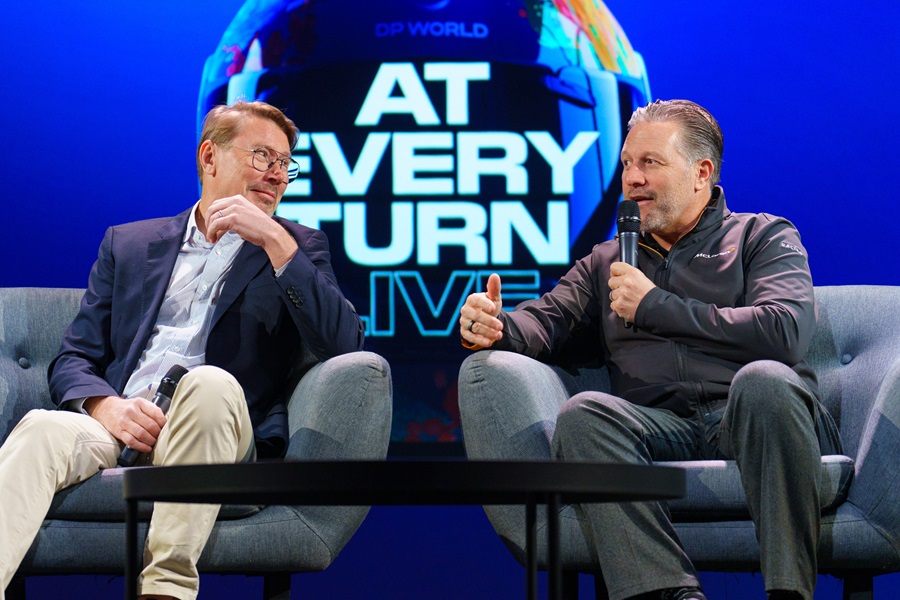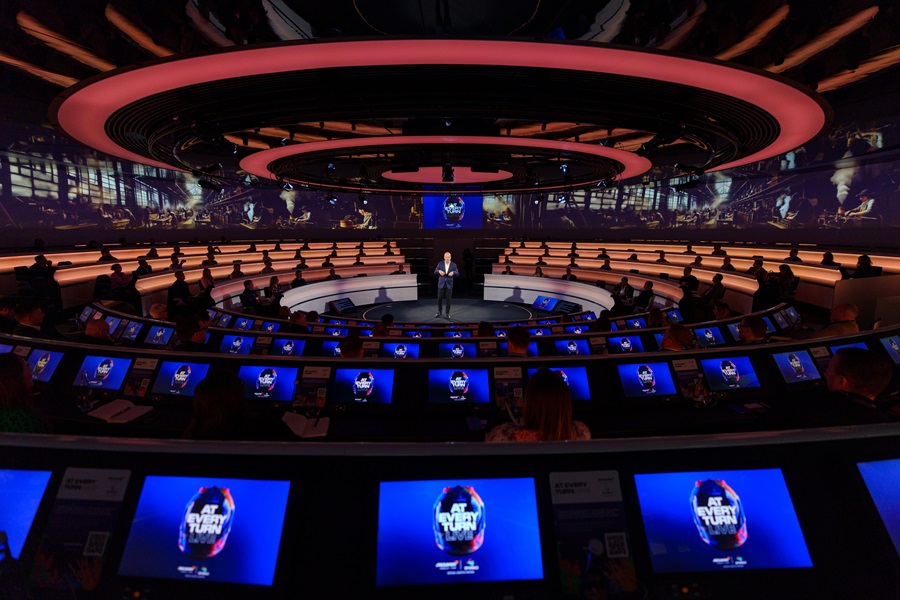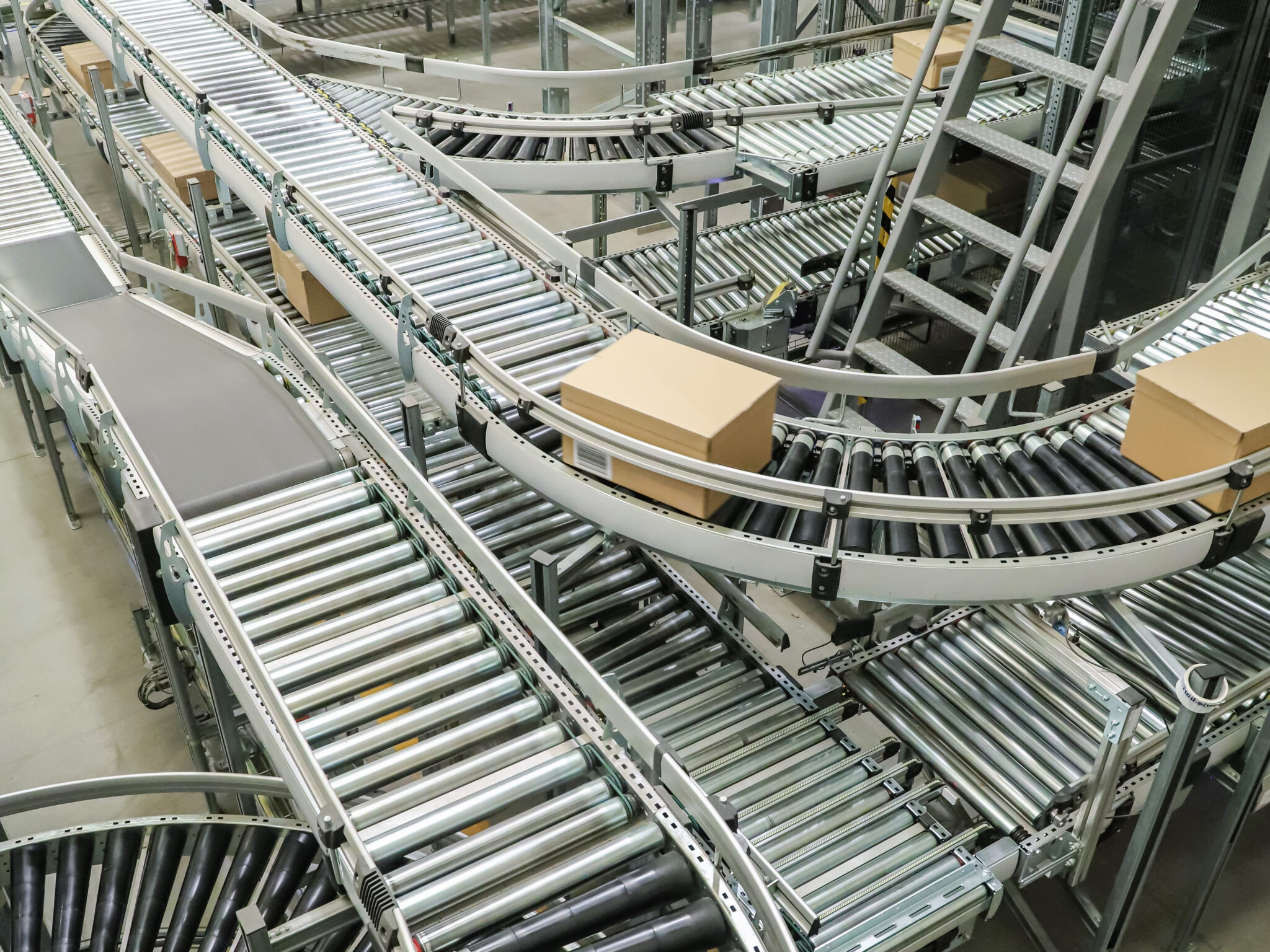As logistics partner of the McLaren Formula 1 Team, DP World recently held an exclusive event for its customers and stakeholders at the McLaren Technology Centre in Woking. Under the banner of ‘At Every Turn Live’, the conference featured a stellar line-up of speakers from the worlds of F1 and logistics, and discussed a wide range of topics including the implications for global trade of the US Election, the impact of AI on transport and logistics, supply chain resilience, and how adopting a ‘pit stop mentality’ can help businesses can take strategic pauses to reset and go again in unpredictable times.
The event, which was compered by Nicki Shields, well-known to motorsport fans as the presenter for Formula E’s TV coverage, got underway with opening remarks from Beat Simon, DP World Group Chief Operating Officer for Logistics, followed by an enlightening conversation between Beat and Andrea Stella, Team Principal of McLaren F1 Team.
Beat believes the synergy between DP World and McLaren lies in an aspiration to propel and to be leading, as well aspassion and precision. “If you look at what happens in F1 or logistics, it’s about things having to work and an entire team working together to make things happen.”
The pair then handed over to innovation guru Dr Chris Brauer, who walked the captivated audience through how AI is shaping today’s business landscape. “It’s a time when collaborations between humans and technology will reshape the world in ways we can only begin to imagine.” He described AI as “one of the most remarkable innovations in the history of civilisation,” going on to highlight areas where it can play a significant role, such as sustainability, and used an example of how the NHS has used AI to optimise its supply chain for short-life blood products, helping to reduce waste, overstocking and guaranteeing supply.
Independent Trade Economist Dr. Rebecca Harding then took the audience on an interactive journey, encouraging them to participate in real-time decision-making as a means to illustrate how global challenges are affecting today’s business landscape and how these may be overcome. With a focus on maritime trade, she workshopped a scenario using real-world examples of the threats supply chains are coming under and concluded with the line: “This was not fiction. Everything we have seen and said today is actually happening.”
Pit Stop Mentality

Peter MacLeod, Editor of Logistics Business Magazine, hosted a panel of three under the ‘Pit Stop Mentality’ title, featuring retail and consumer trends guru Mary Portas, OBE, economist John Ferguson and Hans van der Eijk, Senior Vice President Sales & Account Management Contract Logistics at DP World Europe. The discussion focused on the evolution of logistics and retail, emphasising the shift from physical stores to online efficiency and the impact of COVID-19 on consumer behaviour. Key points included the rise of “beautiful businesses” which prioritise societal roles, the importance of community connection, and the shift from just-in-time to just-in-case inventory management. The conversation also highlighted the significance of sustainability, with businesses integrating recycling and local sourcing.
Additionally, this session touched on the psychological aspects of staying ahead, drawing parallels between motorsport and business leadership, emphasising resilience, motivation, and decision-making under pressure.
Interviewed by BBC chief presenter Maryam Moshiri as part of another panel under the heading ‘Global Race, Global Reach’, Beat Simon summed up DP World’s view on a changing geopolitical landscape by saying logistics is like water: “We are always looking for the easiest way to flow.” Addressing supply chain visibility, he described eloquently how the term can now be applied all the way down to SKU level, giving freight forwarders unprecedented knowledge of the status of a particular shipment. In today’s geopolitical landscape, building resilient supply chains may imply additional costs. Scenario planning is key in planning ahead, remaining agile and ensuring competitiveness.
Cyber Attack Protection
 Sir John Sawers, former chief of the UK Secret Intelligence Service MI6, talked about cybercrime, expressing surprise at how the fear of 10 years ago – of some kind of digital Armageddon – has not happened, but that the threat has instead moved into the world of denial of service attacks of businesses, many of which are happy to pay a ransom rather than risk business disruption. His experience of global affairs led to a fascinating look at how countries are putting mechanisms in place to prevent similar attacks affecting governmental systems.
Sir John Sawers, former chief of the UK Secret Intelligence Service MI6, talked about cybercrime, expressing surprise at how the fear of 10 years ago – of some kind of digital Armageddon – has not happened, but that the threat has instead moved into the world of denial of service attacks of businesses, many of which are happy to pay a ransom rather than risk business disruption. His experience of global affairs led to a fascinating look at how countries are putting mechanisms in place to prevent similar attacks affecting governmental systems.
Matthew Griffin, a leading futurist, said the proceeds from digital/cyber crime is generating revenues of $1.2 trillion, growing at 125% each year. “As we see the levels of cybercrime increase dramatically, your cyber budgets will increase by two-to-three per cent each year.” He described how GPT4 agents have been used to hack into 53% of military systems within two minutes, and how autonomous, adaptable, multi-sensory smart cyber defence systems are now being developed in an attempt to counter this threat.
Sir John said businesses should prepare for events they may not have thought about before, and to consider how they are going to survive if a crucial supply line is threatened. Beat Simon agreed, adding: “Plan for the unexpected.”
Beat Simon welcomed the fact that DP Word’s customers are starting to take climate change very seriously, citing events such as the reduction in capacity of the Panama Canal as a very obvious impact of the crisis, but Sir John said a reversal of US policy may threaten global targets set by the Paris Agreement. Griffin, responding to a question from the audience about the cost of sustainability, said the ultimate target for a business is to be sustainable as well as offering products at a competitive cost. With growing energy costs, this seems challenging at first sight, but renewable energy costs are decreasing, and nearshoring can both cut transport costs and reduce carbon consumption. Taking fast fashion as an example, referencing Mary Portas’ earlier contribution, he cited lab-grown cotton as a way to make this consumer habit more sustainable.
Lessons from McLaren

Formula 1 fans in the audience had plenty of content to keep them engaged; as well as a tour of the McLaren F1 Team factory and a close-up look at some of the brand’s most iconic racing machinery, Zak Brown, CEO of McLaren Racing addressed the audience alongside two-time F1 World Champion Mika Häkkinen. The pair covered considerable ground, dating from their starts in motorsport as young boys all the way up to the latest Grand Prix. Häkkinen spoke passionately about his recovery from a potentially career-ending injury, and the resilience he showed to get back behind the wheel. He also talked about the mentality of going seven years before his first F1 victory, and how he fine-tuned his life – his routines and close team – to achieve his ultimate goals.
Brown’s insight was fascinating, particularly when discussing real-time decision-making and how clear commands and predetermined responsibilities – whilst also allowing space for individual decisions – has helped bring his team back up to championship leaders.
Summarising the day, Rashid Abdulla, CEO and Managing Director, Europe, DP World, said: “It is truly inspiring to be here at the McLaren Technology Centre. The day has been incredibly insightful, with contributions from panellists representing diverse backgrounds, industries, and perspectives. What stands out from McLaren’s example is that while any company can have the best vision and strategy, it is clarity that drives true engagement.
“At DP World, our goal is to build a strong and sustainable business model that delivers value to our customers while ultimately enabling consumers to access better products at lower costs. Events like this are crucial for fostering collaboration and driving innovative solutions for our industry.”
similar news




